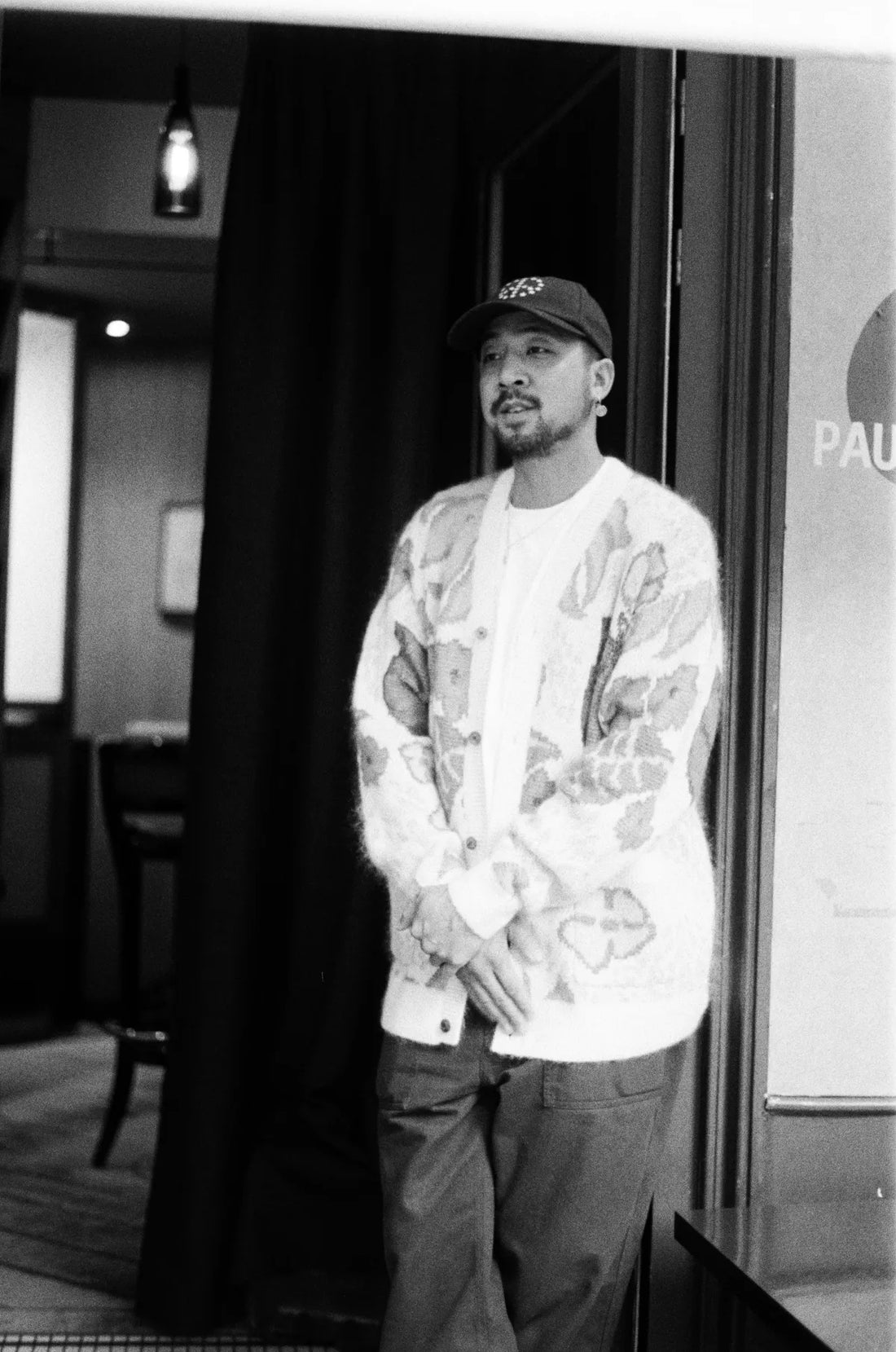Creative Entrepreneur Julien Pham is a curator of people and talent. For his most recent project, Bistrot Tontine, he picks some of his favourite chefs from across the world to come through the restaurant and cook for however long they can. It’s a logistical challenge, but for Julien there’s no other way – it’s vision and heart above everything else. We caught up with Julien in Paris to chat about organized chaos, what a bistrot means to him and his ambitions for the future.
Jonathan Soriano: Thank you for doing this Julien. For me it is this next step in life, Bistrot Paul Bert/Tontine.
Julien Pham: Yes, it is a big deal for me. I don’t even know where to start. Tontine is the project I did in 2019, where I had this opportunity to build my own restaurant. It has always been a dream of mine. I have been an observer of the food industry, I was a food editor for 7 years, and I always felt that if I was to get accepted in that industry, I would have to show them what I could do and earn my merits by opening and running my own restaurant. Food for people I love and respect in this industry.
I was tired after that project. It was a lot. I decided to take a break. Then this opportunity came with Bertrand Auboyneau, an OG in the bistrot scene in Paris, who has been here for 30 plus years, including running the institution Le Bistrot Paul Bert. It’s a simple bistrot with iconic dishes served with natural wines.
JS: So, you decided to team up?
JP: The two of us teaming up was an idea I really liked. We got to talking, and then 6 Rue Paul Bert happened. I love the location, it’s the real Paris, real craftsmen in the street, from the butcher to the bakery to the vinyl shop where the guy is an OG and knows his shit. I could imagine myself in this scene. The bistrot part represents Bertrand and Tontine is me. The result is Le Bistrot Tontine. What is this? It is easy; you’ve got 1, 2, 3, 4 elements on the plate. You understand what’s going on. And if you don’t, at least it is tasty. The vibe can be hectic, but I like to think of it as organized chaos. For the chefs, it would be ideal if I could have the same chefs every time, but the ones I love have a life or live abroad. So, I’ll have them whenever I can. I just had Ash from Chung King Noodles in Berlin – a Chinese chef from Shanghai living in Berlin. She was here for two weeks, because that is all she could give me. Then we’ll have Ha’s Dac Biet from New York – Anthony and Sadie will be here for 2-4 months. I adapt to the people.
JS: That sounds like a tough job working the scheduling and booking chefs?
JP: It is a tough job and to be honest it is not a great financial model – you’ll have to adapt to the chefs and it takes time to transition between kitchens. We also only work with good produce and paying an honest wage. But it is a passion. It is definitely not for the money.

JS: How long are you going to run with this concept? Is there a timeline?
JP: There’s no timeline, which is what I like about this project. It can end in December or go on forever. It is all about the relationship between my partner Bertrand and me. Maybe he’ll get tired of me, or I’ll get tired of him, or we both get tired of each other. Then we stop. It is a process, and we are developing our relationship day by day, getting to know each other. It’s about human connection.
JS: Looking in from the outside (SoMe), you can also feel the human connection between the customers and the staff that is made with the work your do, can you put a few words on that?
JP: Very true, and I never really thought about that, but it is how I like things to be done – that is the bistrot vibe I’m talking about. That word (bistrot) allows me to be hectic, it allows me to put on whatever music I want, it allows me to tell the guests they might have to wait. It allows me to be free. I like the bistrot vibe for the talks, I love that our customers come back to say hi to their favourite sommelier, waiter or chef. They don’t even have a reservation; they are just there to say hi. I love it. We are part of the eco system of the street. Even if we are busy, we try to adapt. It is indeed organised chaos.
JS: I’ve noted that it is not only French food that you serve. How is that working for the bistrot?
JP: To be honest, I would love this place to be a real bistrot. What is a bistrot? It is a place where you know what you are going to get. You go to Bistrot Paul Bert, you crave that same pepper sauce steak, made the same way every time you go. A bistrot has signature dishes, it is comforting. It is your comfort zone. So, I try to create that vibe, so that they trust me here. I want them to trust that this guy (Julian) always brings the good taste. Of course, you cannot always meet everyone’s expectations. Some people might have seen pictures on SoMe, and then we have transitioned when they get here. I tell my staff that once they have seated the customers, they must prepare them mentally for what is going to come. We cannot let them create their own expectations; we must do it for them. For instance, we had a Chinese chef last week and before that a Vietnamese chef. It is two totally different kitchens and visually completely different too. I am still figuring out what a bistrot means for me exactly. For now, I like this evolution we are going through, where I’m finding our identity, building the trusting relationships with the customers. I think I might eventually do it more like Bistrot Paul Bert and take the best dishes from the chefs who have been through here, so you’ll simply have a bunch of signature dishes that are here to stay.
JS: What is interesting to me is how you are adapting the vibe and format but taking out the classic French bistrot dishes and exchanging it for other kitchens. How do you see that going?

JP: That brings us to another topic: France today is not what France used to be. I’m different too as I’m French Vietnamese. I have much love for my French culture and especially gastronomy, but I also have my other culture, and the Vietnamese warm family meals are different.
JS: That’s another interesting topic; how the ethnic food scene has had its own evolution in Europe. You go to the UK and at many restaurants, the Chinese or Indian food has been dumbed down to accommodate the European tastebuds in spice level and even serving fries. The authenticity is gone.
JP: I feel our generation’s mission is to explain what authentic food is. For me, it would be Vietnamese food. My parents could not do this as they came as the first wave of immigrants to France, they just needed to adapt and shut the fuck up, so it created those restaurants. Now, we are French Vietnamese, French Senegalese, French Chinese, now we have to be both and that it was Bistrot Tontine is now. It is not an Asian Bistrot. It can be Alsacian tomorrow or even Danish. Right now, I am into Chinese and Vietnamese. I just want to spread the knowledge on authentic food. More respect. In Paris, when it comes to Chinese food, there is a huge problem with all the clichés. I hate that! People have an expectation that it has to be cheap. So, the restaurants have to adapt and find the cheapest shitty produce available to be able to make a living of an eight-euro dish. And even with all the techniques that come with centuries of craft and knowledge in the Chinese kitchen, the French will still complain about the price. And then, the same people will go and pay 16 EUR for a burger (shaking his head).
JS: We’ve talked about Tontine and its structure and vision, but what does the future hold for Julien Pham?
JP: Like I said, it is an evolution here. It can continue, it can stop. The future is me going abroad. I see myself doing a pop-up in New York in April. I like the energy and the vibe, and I feel I need to give something to that city. Next year, I have a big project here in Paris for one day! I want to mic drop at that moment and go explore Vietnam and the US. I don’t know why. Wait, I do know. Every passion is born out of a frustration, and I was raised with the Vietnamese and American culture. The US influence of entertainment, music, the cinema, the American dream. And the Vietnamese because of my origin, it is so far from here and I have only been once, which is a shame. I have worked so much here, that I always told myself when I go, I will take the time, not just a week or two. Those are two explorations I have to make and also to figure out what I can bring there. Maybe I will come to the conclusion that I cannot contribute with anything and I will leave. But at least I will know, and at least I will have tried. It’s the future man and I’m not scared to try.
JS: That’s a wrap!







